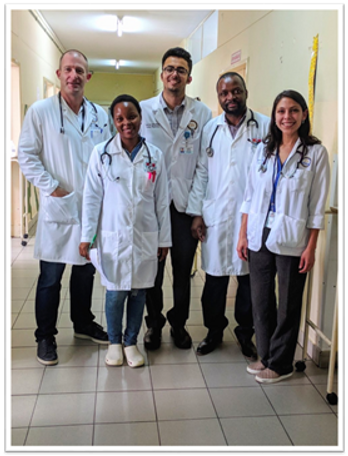Pediatric Residency Program Global Health Partner Sites
Maputo, Mozambique

Dr. Buck far left with UCLA medical students
The UCLA Program in Global Health, together with Partners for Pediatric Progress, has established strong relationships with the Department of Pediatrics at the Central Hospital of Maputo and the Eduardo Mondlane University (UEM) School of Medicine, the primary teaching hospital and medical school in Mozambique. This program began in 2007 and was focused then around medical education and training initiatives; it has now grown into a collaboration that is working towards improving pediatric hospital care in Maputo while supporting the training programs that will produce the next generation of Mozambican physicians.
Mozambique, a former Portuguese colony, is a beautiful country stretching along the eastern coast of southern Africa on the Indian Ocean. Although it is proudly African, Mozambique also identifies closely with its Portuguese history, and this lively combination can be experienced through art, music, and food. The capital city of Maputo is situated on the coast and a short traveling distance from incredible Mozambican beaches and islands and South Africa’s famous Kruger Park. It is a beautiful city filled with colonial era architectural gems and many newer buildings, evidence of the growing economy. While the official language is Portuguese, most Mozambicans also speak multiple tribal languages. Proficiency in Portuguese would be ideal in this setting; conversational Spanish is required to participate. Attempts are made to pair US residents with English-speaking Moz residents although this is not always possible.
Mozambique achieved independence from Portuguese rule in 1975, and then suffered a prolonged civil war that began shortly afterwards, ending in 1992 after a successful UN-negotiated peace agreement. It is now a peaceful nation with impressive economic growth and many natural resources and industries including oil, aluminum, business and tourism. Despite this progress, it is estimated that 54% of the population still live in poverty and in the rural areas the majority of families practice subsistence agriculture.
Mozambique has a total population of 23.5 million with over 10 million children aged 0-14. Despite gains over the past decade, it has some of the highest neonatal and child mortality rates in the world at 77 per 1000 live births (neonatal) and 138 per 1000 (under-five). The major causes of under- five mortality include malaria, diarrhea, acute respiratory infections, and vaccine-preventable diseases.
Malnutrition is also very prevalent contributing to over half of childhood mortality and causing stunting of growth in 44% of children under 5 years. HIV/AIDS is also a challenge with an estimated daily new infection rate of 85 pediatric cases by vertical transmission.
There is a huge shortage of physicians in the country (estimated at one per 37,000 residents), with less than 50 pediatricians, no pediatric subspecialists, and one pediatric surgeon serving the entire country. Visiting US pediatric residents have rotated on the pediatric infectious diseases ward, malnutrition ward and on the general pediatrics services, gaining broad exposure to the variety of medical problems encountered in this setting (including HIV- AIDS, tuberculosis, diarrhea and dehydration, marasmus, kwashiorkor, malaria, and other tropical diseases). In addition to their clinical experience, residents have opportunities to learn more about medical education and the health care delivery system in Mozambique and participate in educational sessions and ongoing quality improvement and/or research projects.

This is the only partner in our global health program with a full-time UCLA faculty member on site, Dr. Chris Buck. Should you choose to do this elective, Chris will work with you to help structure your rotation. He will be your mentor and point person while you are in Maputo.
Over the course of his career, Dr. Buck has developed comprehensive HIV experience along the continuum of pediatric care from PMTCT to antiretroviral treatment and management of comorbidities including TB and malnutrition, and he currently does technical advisory work for the Mozambique Ministry of Health in the areas of pediatric HIV and TB.
Chris did his pediatric residency training at the University of California San Francisco from 2004-2007. After residency, he joined the Baylor International Pediatric AIDS Initiative in Lilongwe, Malawi where he initially worked as a Pediatric AIDS Corps doctor and then as the Associate Director of the Malawi program from 2007-2011. From 2011-2013, he worked as an academic pediatrician for the University of Colorado and Denver Health, while still consulting for the Baylor program in Malawi. He joined CDC Mozambique in 2013 as Pediatric Advisor and served as the country focal point for the PEPFAR-funded Accelerating Children’s Treatment (ACT) initiative.
Dr. Buck graduated from Wake Forest University in 1997 with a BS in Biology and a BA in Spanish, and he did medical school at the University of North Carolina Chapel Hill from 2000-2004. He speaks English, Portuguese, Spanish, and medical Chichewa.
Prior Resident Scholarly Work:
Additional Resources:
- Documentary A Luta Continua
- Anthony Bourdain – No Reservations (Mozambique)
- An Anthropology of Aid in Africa
Application Details:
- Maximum residents to be accommodated is 2 at one time but open to residents year round. Fluency in Portuguese is ideal, proficiency in Spanish is preferred.
- Approximate expenses $2000.
- Mentor in Maputo is Dr. Chris Buck.
- Hospital is Hospital Central de Maputo, Avenida Eduardo Mondlane, Maputo, Mozambique